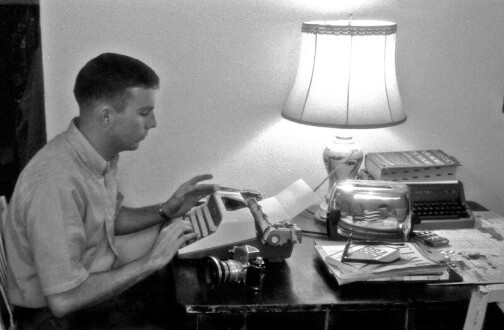In my younger years, I often wondered what it might be like to move up the chain from lowly paperboy to newspaperman, and in fact it was widely believed at the time that I was headed for a career in journalism. Problem is, I couldn’t see myself asking questions at press conferences where no one behind the podium has the slightest interest in telling the truth, or jockeying for a position among a mob of reporters outside a courtroom in order to shout a question at the celebrity defendant.
“So, did you murder your former wife or what?”
“Well, of course I did! Does anyone in his right mind actually believe it was the work of a South American drug cartel?”
Having occasionally sat in for the Tribune’s regional correspondent, I had come to realize that I’m not cut out for reporting. I’m averse to making phone calls and don’t enjoy legwork, although I do enjoy desk work—in particular, trying to find just the right phrase to describe the aftermath of an explosion, wildfire or natural disaster other than “it was like a war zone.”
Nonetheless, there came a day in the mid Sixties when I interviewed for a job at The Salt Lake Tribune—at the newspaper’s venerable location at 143 South Main Street. The building was old and reeked of ink and newsprint. Stepping into the crepuscular newsroom was like stepping into the past, and I suddenly felt naked sans trench coat and crushed fedora. I made my way past a carrel where sat veteran sports editor John Mooney, next to another that barely contained the bulk of Dan Valentine, whose daily humor column “Nothing Serious” was a Utah institution. Then I spotted the nameplate of someone who knew me but whom I had never met: Roy Hudson. Roy was the editor of the newspaper’s Sunday supplement, Home Magazine, wherein my photos and byline had appeared dozens of times as winner of the publication’s weekly snapshot contest. We two shook hands, and soon were joined by staff photographer Van Porter, who reeked of stop bath. So already I had two enthusiastic allies, even though I still felt like a stranger in a strange land.
Next thing I knew, I was being ushered into the office of executive editor Arthur C. Deck, who didn’t bestir himself an inch. Instead, he peered icily over the top of his half-rimmed glasses. I was instantly struck dumb. I can’t remember whether I was offered a job or not. What I wasn’t offered was Dan Valentine’s job, which was the only position in which I had the slightest interest. Valentine, who had run out of gags decades earlier and of whom it was said “couldn’t ad lib a burp at a Hungarian banquet,” would continue on for years before bequeathing the column to his son, Dan Valentine Junior.
I chose that day not to become a staffer, even though I was in desperate need of a job. Why? Because even way back then the Tribune had become a museum-like enterprise, presided over by ink-stained wretches whose time had pretty much passed, whether they knew it or not.
